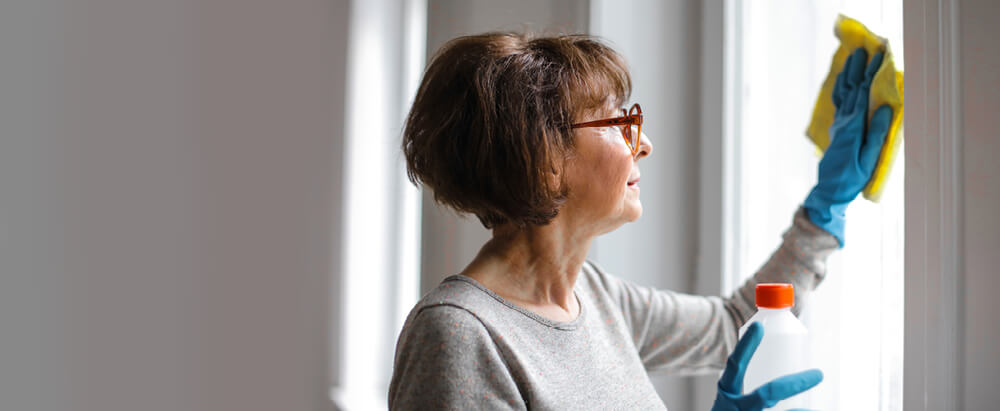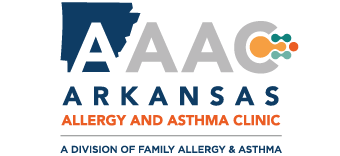Spring Cleaning: How To Make Sure Your House Is Mold and Dust Free
 The thought of spring cleaning incites mixed responses from those with asthma or allergies. Intensive cleaning is important for eliminating allergens in the air and reducing the potential for asthma or allergy flare-ups in your home. However, cleaning kicks up dust that can irritate your allergies. Follow these helpful spring cleaning tips to keep your allergies and asthma at bay during cleaning and throughout the following months!
The thought of spring cleaning incites mixed responses from those with asthma or allergies. Intensive cleaning is important for eliminating allergens in the air and reducing the potential for asthma or allergy flare-ups in your home. However, cleaning kicks up dust that can irritate your allergies. Follow these helpful spring cleaning tips to keep your allergies and asthma at bay during cleaning and throughout the following months!
Spring cleaning can be a chore. For those with asthma and allergies, however, it is a necessity. Plant pollen, dead skin cells, clothing and paper fibers, pet hair, and mold all collect dust and produce many allergy and asthma symptoms. When springtime brings high pollen counts, those already experiencing symptoms have to endure more of it. Cleaning your home means eliminating as many current allergens as possible within your space to protect yourself from having new allergens enter.
Protect yourself from asthma and allergy attacks during spring cleaning.
Those with asthma and allergies will want to avoid dust and mold inhalation and contact as you clean, and there are many tips to protect yourself from this.
- Remember to wear a mask that covers your mouth and nose while dusting, sweeping, or vacuuming—It can take more than two hours for the dust to settle after a thorough cleaning—so, if possible, clean when the allergic patient is away, and avoid cleaning the bedroom of an allergic person at night. Wearing a mask will allow you to breathe safely while protecting yourself from any airborne allergens or dangerous particulate matter.
- Consider wearing gloves. Throw out gloves after a particularly dirty task, and get new ones for the next. Third, dress in long sleeves and pants. Keep your body covered with long-sleeved shirt and pants so that no allergens can bother your skin, causing rashes and hives.
- It is also important to choose cleaning supplies wisely. Remember to choose from allergy-friendly cleaning supplies, not those with harsh chemicals. Also remember to clean from top to bottom, and wipe down surfaces with a wet or damp cloth to capture dust.
- Shower immediately after cleaning. Wash your hands, hair, body, and throw those clothes directly into the washer.
Tips to rid and prevent dust and mold in your home
- Remove candles, air fresheners, and perfumes.
Your favorite scents might be causing your nasal symptoms to flare. These home items include chemicals that could trigger asthma attacks.
- Do not forget to change your air filters.
Instead of opening windows, replace your central air conditioner air filters and vacuum/clean vents. This will ensure that fresh air is moving around your home. Air filters should actually be replaced every 1-3 months.
- Remember also to wash bedding weekly in hot water.
Dust mites love sheets and beds. We recommend washing polyester pillows every two weeks. Sheets, bedspreads, and blankets should be washed every 10-14 days. This can limit your exposure to dust and mold. Make sure to dry your washing thoroughly before use. We do recommend allergen covers or casings for pillows and mattresses that encase the entire mattress and pillow in dust-proof casings.
- You should also wash stuffed animals weekly — if you are allergic to dust mites.
If your children experience symptoms, then the teddy bear that goes everywhere with them is picking up dirt and dust everywhere they go. Pop them into the gentle cycle on hot for a quick clean.
- Use bathroom and kitchen exhaust fans.
Mold loves moisture. If you have bathroom fans, then remember to turn these on to ward off mold. They will improve airflow, and keep your home’s humidity at a good level. Run bathroom or kitchen exhaust fans while you clean to dry up any moisture you may be creating.
- Use dehumidifiers and eliminate standing water.
If you have drainage problems, leaks, or standing water, it is best to addresses these issues around your home. We also recommend using a dehumidifier to keep your home’s humidity down. This can prevent mold growth. It is optimal to keep the humidity level below 60%.
- You should also replace shower curtains and bathmats.
These are two more places that mold spores are growing that you would not normally consider. Mold growing on shower walls, curtain, and tiles should be cleaned with a solution of 1 cup chlorine bleach in a one-gallon bucket of water or use a commercial mold remover such as Tilex. We recommend to use caution when using as these solutions may be irritating to the body.
- Beat and wash upholstery.
Take couch cushions and pillows outside to beat, if you cannot wash them. You want to rid the cushions or dust that has built up on the surface. Replace any carpet with vinyl, tile, or wood flooring. If carpeting is unavoidable, it should be synthetic short pile with a synthetic pad. Vacuum frequently.
- Wash pet beds.
Over the winter you and your pets have likely spent many days snuggled up on the couch. Washing upholstery and pet beds will rid your home of fur, dander, and saliva and keep any pet-related symptoms at bay.
- Consider investing in an air purifier.
Those with allergy symptoms would benefit from an air purifier that filters airborne dust particles.
- Lastly, tackle those hard-to-reach places.
If you are going to truly spring clean, then you need to get those places you have ignored all year. This includes tops of doorways, ceiling fans, under lampshades, blinds, baseboards, walls, and the outside of your refrigerator. We recommend using a mask to when dusting or vacuuming. These may be obtained at most pharmacies and hardware stores. Also, if your home has a wood burning fire, we recommend storing all firewood outdoors.
Contact
Arkansas Allergy & Asthma Clinic in Little Rock and Conway is known for cutting-edge treatments for seasonal and chronic allergic conditions, including mold and dust-related asthma and allergies. For more information on how to make your home dust and allergen free pick up our Environmental Control Measures pamphlet in office. We can work with you to create a custom allergy treatment plan, whether you are a pediatric patient or an adult patient.
Call us today at 501-227-5210 to request an appointment with an allergist so we can get your allergy and asthma symptoms under control. We want your suffering from these conditions to be relieved, so you can lead a happy, healthy life.


